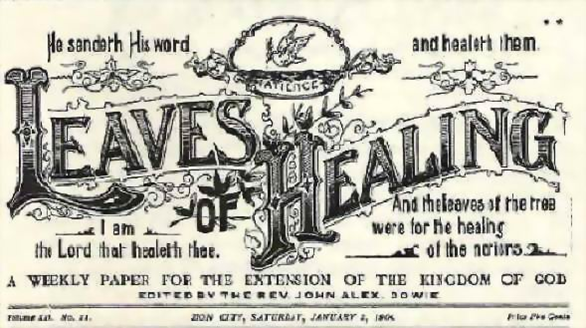John Alexander Dowie
The second aspect of Dowie’s theology of healing is found in Acts 10:38, “…Jesus…went about doing good and healing all that were oppressed of the Devil….” That is, sickness and disease is the enemy of God, a work of Satan, and a result of sin. This is the antithesis of the first tenant. This element of Dowie’s theology grew out of his pastoral ministry. Dowie was serving as a pastor of a Congregational Church in Newtown, outside of Sydney, Australia. A plague had swept throughout the land, and he had buried nearly forty members of his church in just a few weeks. Despairingly, he had visited nearly thirty more members from his church that were sick and dying. During this time, he questioned, “Where, oh where was He who used to heal His suffering children?”14 This was the prayer of a pastor who was crushed by the suffering of those in his flock. “There I sat (after visiting the sick) with sorrow-bowed head for my afflicted people, until the bitter tears came to relieve my burning heart.”15 This caused Dowie to seek God for some degree of comfort. Then Acts 10:38 came to his mind by the Holy Spirit. There he saw “Satan as the defiler and Christ as the healer.”16
In Dowie’s understanding of human sickness, all disease has but two sources, the Devil and sin. These two are closely linked for Dowie. He often described disease as “corruptions born of father Satan and mother Sin.” Disease is the direct effect of sin. In a sermon at the First Baptist Church of Oakland California, Dowie comments, “We teach that disease is a part of ‘the law of sin and death.’ We teach that the law of sin is the Devil’s law, that disease is an effect of sin, working out death, and that death belongs to the Devil; it does not belong to God.”17 Sickness was introduced into the world by sin. Dowie argues that if sin had not entered into the world, sickness would not have entered. Disease therefore is a work of Satan. Not that every sickness and disease is the manifestation of a demon, but that Satan is the author of sickness. In John 10:10, Jesus stated that the thief comes to steal, kill, and destroy, but that He came to bring life. John echoes the same in 1 John 3:8. He writes, “For this purpose the Son of God was manifested, that He might destroy the works of the devil.” With this verse in light of Acts 10:38, Dowie passionately concluded that sickness was a work of the Devil.
 For Dowie, this necessarily implied that sickness was never the work, nor the will, of God. In this, he rejected redemptive suffering from sickness or disease. “Disease does not bring people nearer to God, it drives them further away from Him. It is the Holy Spirit that brings people to God whether sick or well.”18 Thus, God never purposes to use sickness as a chastisement. Furthermore, the hand of God is never the efficacious force behind sickness or disease; it is always the Devil. Dowie concludes that Job was wrong when he stated that “the hand of God has touched me” (Job 19:21). As revealed in the opening drama of Job, it was Satan, and not God that had afflicted Job’s body (Job 2:7). God did not cause Job’s sickness, but permitted it. Dowie applied this hermeneutic to every passage that states God caused sickness or disease.19 Dowie concludes that any translation that reads that God caused or sent sickness is incorrect. God never causes evil of any kind, but he may chose to permit it, as in the case of Job. Dowie stated, “Disease is evil, the product of Satan and sin, hence it can never come from God.”20
For Dowie, this necessarily implied that sickness was never the work, nor the will, of God. In this, he rejected redemptive suffering from sickness or disease. “Disease does not bring people nearer to God, it drives them further away from Him. It is the Holy Spirit that brings people to God whether sick or well.”18 Thus, God never purposes to use sickness as a chastisement. Furthermore, the hand of God is never the efficacious force behind sickness or disease; it is always the Devil. Dowie concludes that Job was wrong when he stated that “the hand of God has touched me” (Job 19:21). As revealed in the opening drama of Job, it was Satan, and not God that had afflicted Job’s body (Job 2:7). God did not cause Job’s sickness, but permitted it. Dowie applied this hermeneutic to every passage that states God caused sickness or disease.19 Dowie concludes that any translation that reads that God caused or sent sickness is incorrect. God never causes evil of any kind, but he may chose to permit it, as in the case of Job. Dowie stated, “Disease is evil, the product of Satan and sin, hence it can never come from God.”20
Category: Church History, Winter 2006


